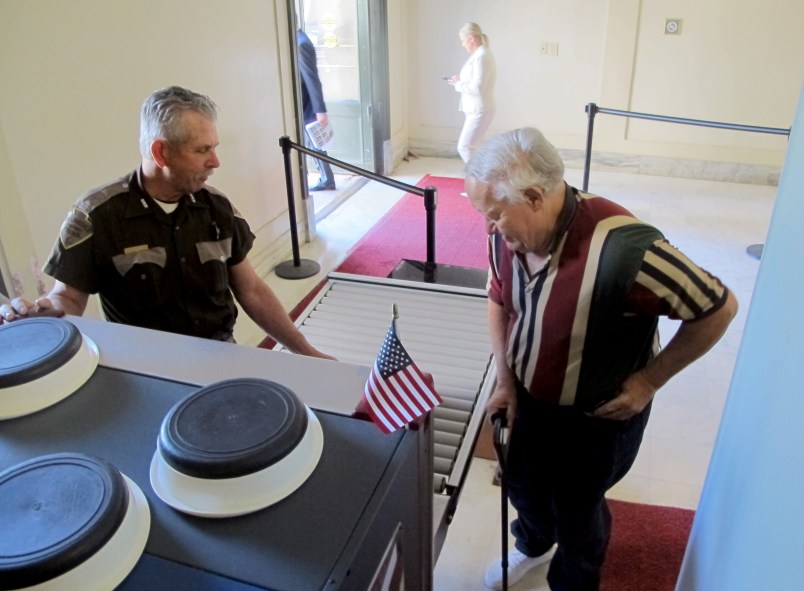OKLAHOMA CITY (AP) — It’s become a common scene at the Oklahoma Capitol: While construction workers, employees and visiting schoolchildren wait patiently to walk through the metal detectors guarding the entrances, a man with a briefcase arrives and breezes straight through the checkpoint without stopping, setting off the alarms. The security officers on duty flinch but look away.
Just a lawmaker in a hurry? That’s all it is, some members say. But security officials are grumbling about a trend among some conservative legislators who are now declining to submit to the weapons screening that has been required at government buildings for years. And suspicions are growing about a likely reason: they’re armed.
“I won’t name names, but I know for a fact that they do,” said Rep. Sally Kern, a conservative Republican who says she doesn’t necessarily disapprove of lawmakers who carry guns at the Capitol. She said several colleagues have admitted to being armed. “I take my colleagues at their word.”
Oklahoma is one of 45 states that now allow some form of open carry of firearms, and pro-firearms lawmakers have been pushing to make guns allowable in most places, even college campuses and public arenas. A bill now pending in the Legislature would eliminate the need for licenses, training or background checks.
But most states have drawn the line at bringing guns into the Capitol. Firearms are permitted in the Texas, New Hampshire and Idaho statehouses, but other conservative states including Oklahoma have turned aside such proposals because of security concerns about government buildings as possible targets of violence. Attempting to bring a gun into the Capitol is a misdemeanor punishable by a fine.
Many lawmakers, including strong gun rights supporters, insist the Capitol should remain a gun-free zone. Republican Gov. Mary Fallin, reliably conservative on all issues, said she worries about having handguns in a place where emotions sometimes run high among advocates and politicians.
“There’s a reason why we have screening when people come into the Capitol, and we have restrictions on bringing guns into the Capitol,” Fallin said. “It would trouble me if someone broke the policy, and the policy is that you can’t as a legislator bring a firearm into the Capitol.”
Nevertheless, officers at the security stations now regularly encounter lawmakers who decline to be screened. During a 30-minute period after a recent lunch break, an Associated Press reporter watched six GOP House members walk through the checkpoints with their briefcases and satchels and set off the alarms.
Members who were asked later wouldn’t admit they were armed, but some were coy about why anyone should object if they were.
“If a legislator wants to carry a firearm in the Capitol, I think they have a constitutional protection to do that,” said Ralph Shortey, a Republican senator, who said weapons screening violates a constitutional prohibition against interfering with lawmakers during a legislative session.
Republican Rep. Lewis Moore said legislators shouldn’t be screened.
“They’re supposed to know who the House members are,” he said of the guards.
Security officials acknowledge they’re reluctant to stop those breezing through if they appear to be lawmakers.
“We do probably err on the side of giving them a little leeway when it comes to screening, but they can’t legally carry,” said Highway Patrol Capt. John Paul, who oversees the security at the Capitol.
But Rep. Mike Shelton, a Democrat, said the reason for the new allergy to metal detectors is obvious, especially after the latest bill to allow guns inside the Capitol stalled in committee.
“I believe at any one time, there may be seven or eight members on the floor of the House who are armed,” said Shelton, who also said several have privately acknowledged carrying.
The idea of guards allowing people in unchecked is controversial among security experts.
“Visual recognition is the poorest form of access control,” said security consultant Frank Pisciotta, president of the North Carolina-based Business Protection Specialists. And if guards “get used to hearing the metal detector go off and they’re not doing anything about it, it becomes more of a nuisance alarm. They just get that mentality that they stop paying attention to it.”
In pro-gun Texas, the statehouse had no security screening until 2010, when a man who had just visited a legislator’s office walked out onto the Capitol steps and fired several shots in the air. Afterward, only those with handgun licenses were allowed to be armed inside.
The Oklahoma lawmakers who are setting off the alarms cause some head-shaking among the people waiting to go through the metal detectors.
“My thought is: Why weren’t they screened?” said Capitol visitor Willis Washington, whose wheelchair was wanded by a security guard after it set off the metal detector. “I think we should all have to play by the same rules.”
___
Associated Press writer Jim Vertuno in Austin, Texas, contributed to this story.
___
Follow Sean Murphy at www.twitter.com/apseanmurphy
Copyright 2016 The Associated Press. All rights reserved. This material may not be published, broadcast, rewritten or redistributed.







“My thought is: Why weren’t they screened?” said Capitol visitor Willis Washington, whose wheelchair was wanded by a security guard after it set off the metal detector. “I think we should all have to play by the same rules.”
Ah, the insidious beauty of the gun-nut position:
By putting guns everywhere, they are making the only viable defense (even for a normal argument) ensuring that you yourself are also armed, lest you become a stand-your-ground statistic.
The gun is the new flag pin, I guess.
Yup. They need it to defend themselves from those women-dressed-as-men who are attempting to molest them in the toilets.
If someone saw a lawmaker’s weapon, could they call 911 with an active shooter report?